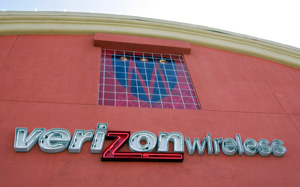| Home | Blog | Ask This | Showcase | Commentary | Comments | About Us | Contributors | Contact Us |

How do the big telecoms qualify as small businesses?ASK THIS | June 174, 2006Bruce Kushnick, in the fourth of a series, says giant firms are gaming the system, using fronts for FCC auctions of the airwave spectrum. By Bruce Kushnick Q. Under what circumstances to do AT&T, Cingular, Verizon, T-Mobile and Sprint qualify as “very small businesses”? What financial windfalls result from their posing as small businesses? Q. Why does the government – particularly the Federal Communications Commission and the Department of Justice – allow it to happen? Why hasn’t the government demanded its money back? Q. How have such practices harmed competition? How much have companies pocketed through deceptive practices that allowed them to game the spectrum auctions for wireless services? The story is simple. Each year the FCC auctions off the “spectrum,” which grants winning companies the right to broadcast television, radio, wireless services, broadband services, etc. Also known as the “airwaves,” this spectrum is owned by the American public, and the public, through the federal government, licenses the use of the airwaves. On June 29th, 2006, the FCC was to hold its 66th auction of the spectrum for Advanced Wireless Services (AWS), a process expected to yield between $9 billion and $15 billion. The FCC, in creating this auction, is supposedly “promoting the rapid deployment of broadband, voice, and data services to the public by new AWS licensees.” Congress made sure that provisions in the Telecommunications Act of 1996 allowed small businesses to compete in telecommunications and information markets, and the act removed barriers to entry for entrepreneurs. The Federal Communications Commission (FCC) is the regulatory branch supposed to ensure the fulfillment of these obligations. The policy of small-business spectrum licenses, also called “entrepreneur” licenses, is not new. It was discussed in the first FCC report on wireless competition in 1995: “[For certain parts of the spectrum,] the Commission has limited bidder eligibility to ‘entrepreneurs’ with less than $125 million in gross revenues and $500 million in total assets. Winning bidders for these entrepreneurs' blocks may pay for their licenses in installments and small businesses (under $40 million in gross revenues), including small businesses owned by minorities and women and small rural telephone companies, are eligible for bidding credits and enhanced installment payments.” Yet the largest phone companies in America (and internationally) have applied for and received spectrum space set aside for “entrepreneurs” and “very small businesses.” The phone companies have gamed the regulatory system by creating front groups, commonly known as “designated entities” that pose as small carriers and apply for licenses. [Click here for details of the complaint filed by my group, Teletruth, in May.] This out-and-out deception is not new, but it is growing, and the FCC has ignored the issue. This occurs despite FCC Commissioner Michael Copps’ awareness that these practices “erode the integrity of our auctions by masquerading as small carriers”, and will impact the current and future auctions, not simply the past auctions. “I expressed concern [Copps said] about misuse of our Designated Entity program – calling for action to fix it in advance of the AWS [airwave] auction . . . the DE program plays a critical role in ensuring that smaller carriers have a fighting chance to obtain spectrum resources. But at the same time, we have a solemn obligation to take a strong stand against abuses of the program. We must not allow deep-pocketed companies or individuals to erode the integrity of our auctions by masquerading as small carriers. It is critically important that we act to ensure reforms that protect against fraud in time for the upcoming AWS auction.” He’s right: this is fraud. Imagine that your state is building a road, and a percentage of contractors must be small businesses. However, on investigation you see that contractors larger than Trump have created shell companies to bid on the contracts. Wouldn’t those contractors be put in jail? This is no different. This problem is deep and insidious. There has been recent legal action taken in one case, as pointed out by USA Today: “[Designated] Entities were formed a few days before each auction, often were dissolved shortly afterward and never used the licenses, some of which were later sold for profit, the lawsuit says. In statements, [the] telecom company, Lynch Interactive, called the suit ‘frivolous’ and says it ‘adhered to both the letter and spirit’ of FCC rules.” An Open Secret As noted, this problem has been going on for a while, thanks to the failure of the FCC to enforce the small business statutes. In its 2001 and 2002 annual reports to the Securities and Exchange Commision, Cingular acknowledged that it had distributed over $4.3 billion dollars to shell companies that play-act as small businesses. In promoting itself, the company claims, “Cingular Wireless is the largest wireless company in the United States, with more than 54 million subscribers who use the nation's largest digital voice and data network.” Cingular is owned by BellSouth and SBC (recently renamed AT&T). Yet this company successfully applies for small business licenses. Similarly, T-Mobile is owned by Deutche Telecom, Germany’s largest phone company. T-Mobile writes: “We do not qualify as a Designated Entity, and so in order to continue expanding service to our customers, we currently hold non-controlling ownership interests in two companies that qualify as Designated Entities, Cook Inlet/VS GSM V PCS Holdings, LLC (“CIVS V”) and Cook Inlet/VS GSM VI PCS Holdings, LLC (“CIVS VI”). Verizon is also a “very small business.” Verizon has said that it and Vista PCS were the two highest bidders in the broadband personal communications services licenses auction, netting “63 licenses totaling approximately $697 million” on February 15, 2005. Never heard of Vista PCS? That’s because Vista PCS is a Verizon front company. The Harm to Competition This is crime being committed against the U.S. government and against competition. And yet, no agency has taken action against practices that any five-year-old could understand as just plain wrong. It’s not that agencies aren’t aware. The Department of Justice knows there’s a problem: “In the Department's extensive experience reviewing DE's relationships with large wireless carriers in its numerous wireless merger investigations, it has often encountered DEs that are not independent of large enterprises.” Why, then, hasn’t this agency gone after the money in the previous auctions? The Department knows that these supposed small businesses and entrepreneurs are controlled by large phone companies. Conclusions: The gaming of auctions is a deceptive-practices case and should be treated as such. The FCC should be taken to task over its failure to protect the rights of small businesses and an investigation by Congress should commence into failure to enforce Section 257 of the Telecommunications Act. (Internet service providers and many competitive local phone companies also have been harmed by the FCC’s failure to enforce Section 257 of the Act.) In addition, the FCC and DOJ, SEC should:
Such practices erode broadband competition. As discussed in previous stories, America is currently rated 16th in the world in broadband connectivity, in part because the phone companies failed to deliver on promises to rewire America with fiber optic services. Instead, the Bell companies rolled out inferior DSL services over the old copper wiring, but pocketed the money from customers (see first article). Now we find another scam that could harm America’s broadband and economic growth. The phone companies, by rigging the bidding and allowing their deceptive partners to win licenses (which come in addition to their own licenses), have closed the door on innovative smaller competitors who want to use wireless broadband yet don’t have the deep pockets the Bells do. The Bell companies have been convincing state legislatures for years to outlaw municipality infrastructure projects, arguing that they (the Bells) should be granted monopoly rights in many regions. And now we find them posing as “Very Small Businesses” – yet another attempt to keep their monopoly control.
|




